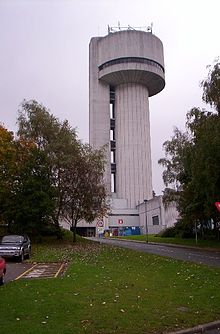 Aerial view of Daresbury Laboratory | |
| Established | 1962 |
|---|---|
Laboratory type | National scientific research laboratory |
Field of research | |
| Director | Paul Vernon |
| Staff | 300[1] |
| Location | Daresbury, England 53°20′35″N 2°38′26″W / 53.34306°N 2.64056°W |
Operating agency | Science and Technology Facilities Council |
| Website | www |
| Map | |
Daresbury Laboratory is a scientific research laboratory based at Sci-Tech Daresbury campus near Daresbury in Halton, Cheshire, England. The laboratory began operations in 1962 and was officially opened on 16 June 1967 as the Daresbury Nuclear Physics Laboratory (DNPL) by the then Prime Minister of United Kingdom, Harold Wilson. It was the second national laboratory established by the British National Institute for Research in Nuclear Science, following the Rutherford High Energy Laboratory (now Rutherford Appleton Laboratory).[2] It is operated by the Science and Technology Facilities Council, part of UK Research and Innovation. As of 2018, it employs around 300 staff,[1] with Paul Vernon appointed as director in November 2020,[3] taking over from Professor Susan Smith who had been director from 2012.
Description

Daresbury Laboratory carries out research in fields such as accelerator science, bio-medicine, physics, chemistry, materials, engineering and computational science. Its facilities are used by scientists and engineers, from both the university research community and industrial research base. The laboratory is based at Sci-Tech Daresbury.[1]
Facilities and research
- Accelerator science, including the Cockcroft Institute which houses scientists from STFC, University of Manchester, University of Liverpool, University of Lancaster, and University of Strathclyde. Accelerator science facilities include:
- VELA (Versatile Electron Linear Accelerator), an electron compact linear accelerator, based around an RF photocathode gun.[4]
- CLARA (Compact Linear Accelerator for Research Applications), an electron linear accelerator to be used for research in free-electron lasers.[5]
- FEBE (Full Energy Beam Exploitation), a beamline of CLARA designed for 2 GeV electron research.[6]
- SuperSTEM, a national research facility for advanced electron microscopy. The facility belongs to EPSRC.[7]
- The Hartree Centre, a high performance computing, data analytics and AI research facility.[8]
- Scientific computing
- Nuclear physics
- Detector systems
- Superconducting Radio-Frequency Lab (SuRF Lab)[9]
- Engineering Technology Centre[10]
- Public engagement
- The University of Liverpool Virtual Engineering Centre[11]
- PsiQuantum[12]
Retired facilities
- NINA (Northern Institute's Nuclear Accelerator), an electron synchrotron; the first accelerator at the site.
- ALICE (Accelerators and Lasers In Combined Experiments), an electron accelerator previously known as ERLP (Energy Recovery Linac Prototype).[13]
- EMMA (Electron Machine with Many Applications or Electron Model for Many Applications), a linear non-scaling FFAG accelerator.
- NSF (Nuclear Structure Facility), a tandem Van de Graaff accelerator housed in the tower.
- HPCx, a supercomputer (replaced by the UK national supercomputing service, HECToR, based in Edinburgh).[14]
- Synchrotron Radiation Source (SRS)
Awards
In 2009 the laboratory was awarded the title of the "Most Outstanding Science Park" at the UK Science Parks Association.[15]
See also
- Alec Merrison Daresbury Laboratory's first director
- Cockcroft Institute International centre for accelerator science and technology at Sci-Tech Daresbury
- Van de Graaff generator The former Nuclear Structure Facility at Daresbury was based on a Van de Graaff accelerator
- Arthur Dooley The Laboratory has a piece 'Splitting of the Atom', unveiled in 1971, constructed from magnetic steel and two 37 inch pole tips taken from the cyclotron.[16]
References
- ^ a b c "Daresbury Laboratory - Science and Technology Facilities Council". Retrieved 5 July 2020.
- ^ British electron synchrotron, Physics Today 17, 9, 65 (1964); https://doi.org/10.1063/1.3051849
- ^ "New Head of Daresbury Laboratory appointed". www.ukri.org. 14 September 2020. Retrieved 22 August 2022.
- ^ 'The Versatile Electron Linear Accelerator (VELA)' at astec.stfc.ac.uk Archived 2 February 2017 at the Wayback Machine Accessed 29 January 2017
- ^ CLARA Compact Linear Accelerator for Research and Applications Archived 2 February 2017 at the Wayback Machine Accessed 29 January 2017
- ^ Angal-Kalinin, D.; Bainbridge, A. R.; Jones, J. K.; Pacey, T. H.; Saveliev, Y. M.; Snedden, E. W. (October 2022). "THE DESIGN OF THE FULL ENERGY BEAM EXPLOITATION (FEBE) BEAMLINE ON CLARA" (PDF). 31st Int. Linear Accel. Conf. ISBN 978-3-95450-215-8. ISSN 2226-0366.
- ^ Official website of SuperSTEM Accessed 29 January 2017
- ^ "£30m grant announced by George Osborne at Daresbury Science Park". February 2013. Retrieved 1 February 2013.
- ^ "ESS cavity milestones at Daresbury Laboratory". Science and Technology Facilities Council. 4 November 2021.
- ^ "Technology at Daresbury". Retrieved 31 January 2019.
- ^ "Virtual Engineering Centre | Locations". Retrieved 31 January 2019.
- ^ "PsiQuantum opens R&D facility at Daresbury Laboratory". 5 October 2023.
- ^ ALICE (Accelerators and Lasers In Combined Experiments) at astec.ac.uk via Wayback Accessed 29 January 2017
- ^ HPCx - UK National Supercomputing Service 2002 - 2010 Archived 3 January 2020 at the Wayback Machine Accessed 29 January 2017
- ^ Clay, Oliver (24 September 2009). "Science park hailed as a UK trendsetter". Runcorn Weekly News. Trinity Mirror North West & North Wales. p. 3.
- ^ "Public Monument and Sculpture Association Record". Archived from the original on 12 August 2010. Retrieved 9 July 2010.
External links
- Daresbury Laboratory at Sci-Tech Daresbury
- The Science and Technology Facilities Council
- Synchrotron Radiation Source
- Accelerator Science and Technology Centre
- 4GLS - the proposed Fourth Generation Light Source









